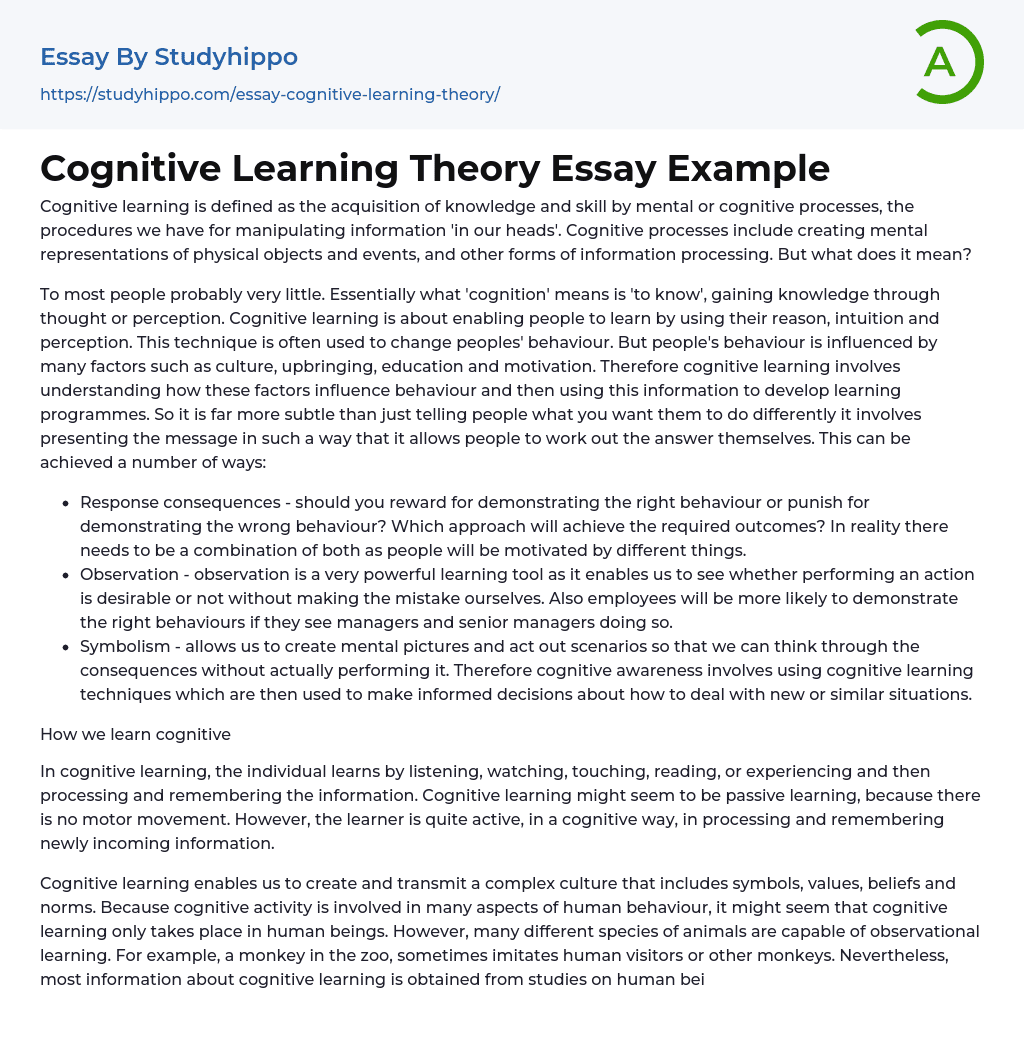Cognitive learning is defined as the acquisition of knowledge and skill by mental or cognitive processes, the procedures we have for manipulating information 'in our heads'. Cognitive processes include creating mental representations of physical objects and events, and other forms of information processing. But what does it mean?
To most people probably very little. Essentially what 'cognition' means is 'to know', gaining knowledge through thought or perception. Cognitive learning is about enabling people to learn by using their reason, intuition and perception. This technique is often used to change peoples' behaviour. But people's behaviour is influenced by many factors such as culture, upbringing, education and motivation. Therefore cognitive learning involves understanding how these factors influence behaviour and then using this information to develop learning programmes. So
...it is far more subtle than just telling people what you want them to do differently it involves presenting the message in such a way that it allows people to work out the answer themselves. This can be achieved a number of ways:
- Response consequences - should you reward for demonstrating the right behaviour or punish for demonstrating the wrong behaviour? Which approach will achieve the required outcomes? In reality there needs to be a combination of both as people will be motivated by different things.
- Observation - observation is a very powerful learning tool as it enables us to see whether performing an action is desirable or not without making the mistake ourselves. Also employees will be more likely to demonstrate the right behaviours if they see managers and senior managers doing so.
- Symbolism - allows us to create
mental pictures and act out scenarios so that we can think through the consequences without actually performing it. Therefore cognitive awareness involves using cognitive learning techniques which are then used to make informed decisions about how to deal with new or similar situations.
How we learn cognitive
In cognitive learning, the individual learns by listening, watching, touching, reading, or experiencing and then processing and remembering the information. Cognitive learning might seem to be passive learning, because there is no motor movement. However, the learner is quite active, in a cognitive way, in processing and remembering newly incoming information.
Cognitive learning enables us to create and transmit a complex culture that includes symbols, values, beliefs and norms. Because cognitive activity is involved in many aspects of human behaviour, it might seem that cognitive learning only takes place in human beings. However, many different species of animals are capable of observational learning. For example, a monkey in the zoo, sometimes imitates human visitors or other monkeys. Nevertheless, most information about cognitive learning is obtained from studies on human beings. |
The Cognitive Learning Theory explains why the brain is the most incredible network of information processing and interpretation in the body as we learn things. This theory can be divided into two specific theories: the Social Cognitive Theory (SCT), and the Cognitive Behavioural Theory (CBT). When we say the word “learning”, we usually mean “to think using the brain”. This basic concept of learning is the main viewpoint in the Cognitive Learning Theory (CLT). The theory has been used to explain mental processes as they are influenced by both intrinsic and extrinsic factors,
which eventually bring about learning in an individual.
Cognitive Learning
Theory implies that the different processes concerning learning can be explained by analysing the mental processes first. It posits that with effective cognitive processes, learning is easier and new information can be stored in the memory for a long time. On the other hand, ineffective cognitive processes result to learning difficulties that can be seen anytime during the lifetime of an individual.
Social cognitive theory is the view that people learn by watching others. In psychology, it explains personality in terms of how a person thinks about and responds to one's social environment. For example, in the 1960s Albert Bandura (a pioneer in social cognitive theory) argued that when people see someone else awarded for behaviour, they tend to behave the same way to attain an award. People are also more likely to imitate those with whom they identify. Bandura famously illustrated social learning by showing children a video of a girl punching a doll; presented later with a doll, the children behaved in similarly aggressive ways.
- Resilience essays
- Intelligence essays
- Problem Solving essays
- Perception essays
- Consciousness essays
- Mindset essays
- Interpretation essays
- Plagiarism essays
- Analogy essays
- Learning English essays
- Abnormal Psychology essays
- Abraham Maslow essays
- Attachment Theory essays
- Authority essays
- Behaviorism essays
- Classical Conditioning essays
- Cognitive Psychology essays
- Counseling essays
- Developmental Psychology essays
- Educational Psychology essays
- Erik Erikson essays
- Family Therapy essays
- Jean Piaget essays
- Maslow's Hierarchy Of Needs essays
- Mental Health essays
- Operant Conditioning essays
- Personality Psychology essays
- Positive Psychology essays
- Psychoanalysis essays
- Psychotherapy essays
- Sigmund Freud essays
- Social Psychology essays
- Stanford Prison Experiment essays
- Supersize Me essays
- Coaching essays
- Critical Thinking essays
- homework essays
- Learning essays
- Library essays
- Listening essays
- Literacy essays
- Mentor essays
- Physical Education essays
- Project essays
- Reading essays
- Research essays
- Sex Education essays
- Social Studies essays
- Standardized Testing essays
- Study Plan essays




